Picture of the week
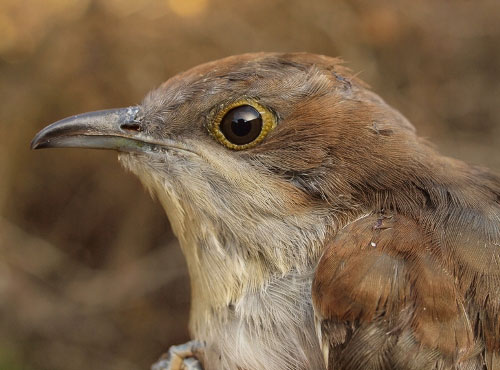
Last week we featured the eighth Eastern Phoebe banded at MBO this fall; this week
we have the eighth Black-billed Cuckoo over MBO’s entire history!
(Photo by Simon Duval)
|
– |
|
Banders-in-charge: Simon Duval, Gay Gruner
Assistants: Christine Barrie, Nicolas Bernier, Yvan Bernier, Sue Bishop, Marc Boisvert, Cindy Bouchard, Gabrielle Cottam, David Davey, Jean Demers, Steve Dumont, Jo-Annie Gagnon, Nathalie Gendron, Julie Hamel, Lisa Keelty, Line Lamontagne, Lance Laviolette, Barbara MacDuff, Don MacDuff, Francine Marcoux, Betsy McFarlane, Marie Perkins, Benoit Piquette, Catherine Russell, Ahmad Shah, Clémence Soulard, Patricia Stotland, Elise Titman, Rodger Titman, Jay VanderGaast
Notes: Week 10 has traditionally been very productive at MBO, and again this year it did not disappoint. The 483 birds banded this week marked the busiest period of 2013, with nearly twice as many birds banded as last week. Offsetting that though, we had below average species diversity for the first time this fall, with only 70 species observed over the course of the week, despite an impressive (for October) count of 50 on October 5.
By October, the list of species observed and banded for the season is already quite long, and relatively few additions occur in a given week. For week 10, we added only Black-billed Cuckoo and Winter Wren to our banding list, and Common Merganser to the count of species seen from the site this fall.
This week’s top 10 [last week’s rank in brackets]
|
This week’s influx of birds banded was primarily thanks to a big movement of Ruby-crowned Kinglets – a species that has dominated week 10 in three previous years (2006, 2007, 2009), and has been either second or third in all five other previous years. This is actually a particularly predictable time of year, as White-throated Sparrow has been in the top three in 8 of 9 years (including number one in 2005 and 2011), and Yellow-rumped Warbler has managed the same in 6 of 9 years (including top spot in 2008, 2010, and 2012). Following closely behind the top trio this year was American Robin, a sharp jump from the zero banded last week, but not surprising given the large flocks last week that foretold what was to come. Also increasing in numbers this week were Golden-crowned Kinglets, although as usual remaining much less abundant than their Ruby-crowned relatives. The steady migration of Song Sparrows continues, with this week’s 22 individuals bringing the season total to nearly 250. Juncos are increasing, presumably leading up to a big end-of-season finish as they typically do. Hermit Thrushes are another October specialty at MBO, and there is a good chance numbers will increase further next week. Blue Jays snuck into the top ten this week, and although Nashville Warbler numbers have consistently remained below average this fall, they were again common enough this week to be included in the top ten.
Canada Goose was the most abundant species in week 10, as has been the case every year except 2012. Last year it was Common Grackle that topped the list, and again this year the flocks built substantially in week 10, but only enough to reach second place. American Robin numbers nearly doubled from last week, and helped push American Crow down to fourth place. The Ruby-crowned Kinglets were not just abundant in the nets, we also saw them everywhere, with a mean daily count of 54 individuals. Not far behind were White-throated Sparrows, as usual attempting (with limited success) to offer a bit of a dawn chorus for our volunteers. Blue Jay flocks continued to move through in increasing numbers, and European Starlings and Red-winged Blackbirds re-entered the top ten, largely in association with mixed flocks dominated by grackles. Our resident Black-capped Chickadees are hanging in there, this week just barely still among the ten most abundant species on site.
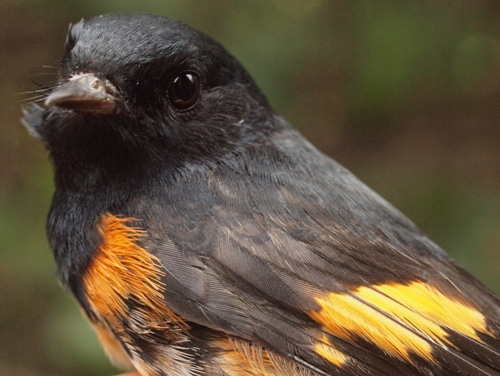
We almost always have an American Redstart or two still passing through MBO in October; this year it was a striking after-hatch-year male.
(Photo by Simon Duval)
On the owling front, it was a productive week with respect to foreign recaptures. Early in the week we learned that an owl we recaptured on October 2 had been banded on 10 October 2010 near Ellensville, New York. Then on October 8 we had a record three foreign recoveries in the same night – two banded by Scott Weidensaul’s crews in Pennsylvania on 17 October and 20 October 2010, and another by Glenn Proudfoot New Paltz, New York, exactly one year ago. The next night we had yet another foreign recovery, but we have yet to track down its origins.
We have another three weeks left in the Fall Migration Monitoring Program, and another four weeks of standardized owling. Watch for updates on the remainder of the season for both programs to be posted around mid-November.
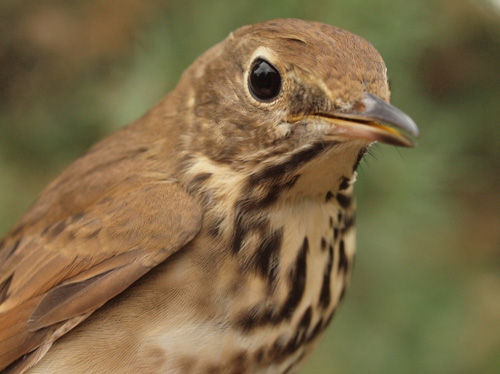
Continuing with brown October birds, one of this week’s several Hermit Thrushes.
(Photo by Simon Duval)
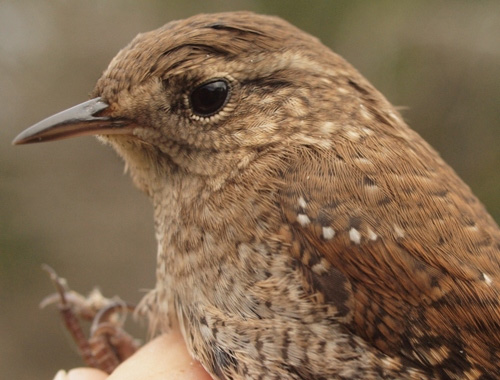
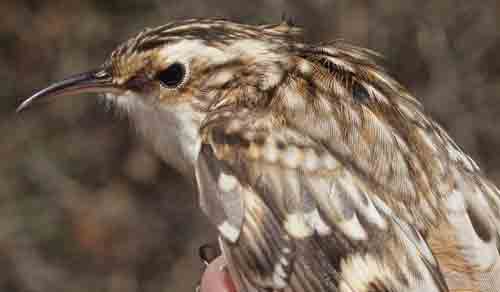
Comments are closed